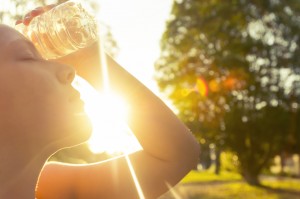Heat-Related Illnesses
As we move toward the hottest weather of the summer season, it’s good to be aware of heat-related illnesses and how to treat them. Working or exercising outdoors in hot, humid weather without adequate hydration can leave our bodies vulnerable to heat-related illnesses. People who live in housing without air conditioning are also at risk. These conditions will develop quickly when our bodies are no longer able to regulate our temperature and keep us cool. Babies and the elderly will likely be the first ones affected by the heat. They should be closely monitored.
 Most symptoms of heat-related illnesses can be alleviated by resting, drinking water, and cooling the body. Sports drinks like Gatorade and Powerade are helpful because they replace electrolytes that the body has lost through sweating. Alcoholic drinks and beverages containing caffeine should be avoided because they dehydrate the body. More serious heat-related symptoms, like those of heat stroke, require immediate medical treatment.
Most symptoms of heat-related illnesses can be alleviated by resting, drinking water, and cooling the body. Sports drinks like Gatorade and Powerade are helpful because they replace electrolytes that the body has lost through sweating. Alcoholic drinks and beverages containing caffeine should be avoided because they dehydrate the body. More serious heat-related symptoms, like those of heat stroke, require immediate medical treatment.
Here are some common heat-related illnesses and how to recognize their symptoms. Treatment should begin as soon as any symptoms become apparent.
- Heat cramps– Muscles may cramp after exercising. As our bodies sweat, we lose water, salt, and electrolytes. Treatment- rest, cool off, drink water or sports drinks that contain electrolytes.
- Heat syncope– The person feels faint or lightheaded. Treatment- lie down in a cool environment; drink fluids.
- Heat exhaustion– Symptoms of heat exhaustion include weakness, fatigue, dizziness, headache, nausea, vomiting, cramps, dark colored urine, and profuse sweating. Treatment- stop the physical activity, cool off, drink water or a sports drink.
- Heat Stroke– Symptoms of heat stroke include mental confusion, rapid heart rate, unconsciousness, seizure, difficulty breathing, and skin that is red, hot, and dry. Heat stroke is a medical emergency. It can cause shock, organ failure, and brain damage. Get medical help immediately. This condition is life-threatening.




